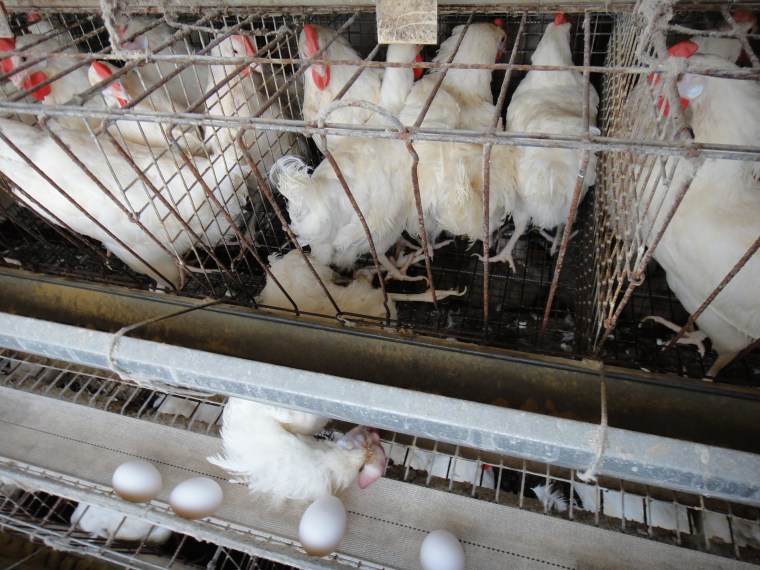The Humane Society of the United States on Wednesday took aim at the largest producer of fresh eggs in the country, releasing images and a report it said documents federal safety violations and inhumane treatment of chickens.
The group said it had placed an undercover activist as a worker at an egg farm owned by Cal-Maine, which sells eight billion eggs a year and is based in Jackson, Miss. Cal-Maine was also one of the companies to voluntarily recall hundreds of thousands of eggs in recent weeks because of salmonella concerns.
Over 28 days in October and November, the Humane Society stated, the activist "documented multiple abuses and food safety threats" at the farm in Waelder, Texas, including:
- "Birds trapped in cage wires, unable to reach food or water. Cage wires can trap hens’ wings, necks, legs and feet, causing other birds to trample the weakened animals, usually resulting in a slow, painful death.
- "Abandoned hens. Live birds were roaming outside their cages, some falling into manure pits.
- "Injuries. Birds had bloody feet and broken legs from cage wires.
- "Overcrowding injuries. Cal-Maine crams multiple birds into one cage, giving each hen only 67 square inches of cage space — less than a sheet of paper on which to live for more than a year.
- "Eggs covered in blood and feces."
"Time and again, we’ve found that these massive facilities caging hundreds of thousands of animals do not properly care for the birds or safeguard our food supply," society President Wayne Pacelle said in a statement. "It’s time for the egg industry to embrace cage-free housing systems and move away from battery cage confinement methods."
In response, Cal-Maine said it "offers all of its customers the choice of cage-free eggs" and noted that "none of the eggs in the recent nationwide recalls were produced in Cal-Maine facilities."
The company added that it "has been a leader in accepting and implementing animal welfare measures. ... Each employee involved in the care and handling of our hens is required to review, sign and comply with our Company code of conduct regarding the ethical treatment of hens which requires employees to report any possible violations."
"All of Cal-Maine Foods’ eggs are produced in accordance with United Egg Producers (UEP) animal care guidelines," it noted. "The UEP guidelines are based on recommendations from an independent scientific advisory committee. The guidelines place top priority on the comfort, health and safety of the chickens."
The Humane Society, for its part, sent letters Wednesday to the Food and Drug Administration and the U.S. Department of Agriculture, urging them to "prioritize the inspection of this facility and to open up the Egg Safety Rule for revision to address the link between housing systems and Salmonella risk and to plan a phase out of the cage confinement of hens."
Michael Greger, the Humane Society's director for public health and animal agriculture, told msnbc.com that Senate approval Wednesday of the Food Safety Modernization Act "will hopefully be a step towards giving FDA greater inspection and enforcement authority."
"In terms of animal cruelty, unfortunately there are no federal laws covering farm animal treatment on the farm," he added.
"And most states exclude farm animals and/or exempt common agriculture practices from consideration. So even if one of these sorts of actions could bring criminal charges of animal cruelty if done to a dog or cat, for example, in most cases the egg industry can proceed with impunity."
"In terms of food safety" rules, Greger said, "the new egg safety rule that went into effect this summer does have biosecurity and hygiene requirements that our investigation documented violations of, for example, an inadequate control of disease spreading vectors such as flies; the manure-covered birds escaped from their cages that can travel from one barn to another via the manure trenches; and the general lack of meeting cleaning and disinfection standards."
